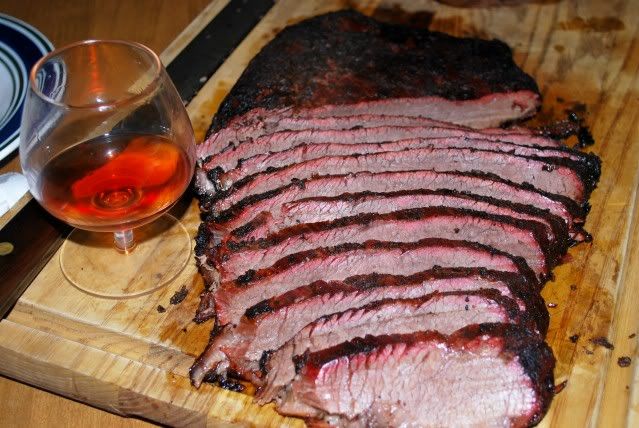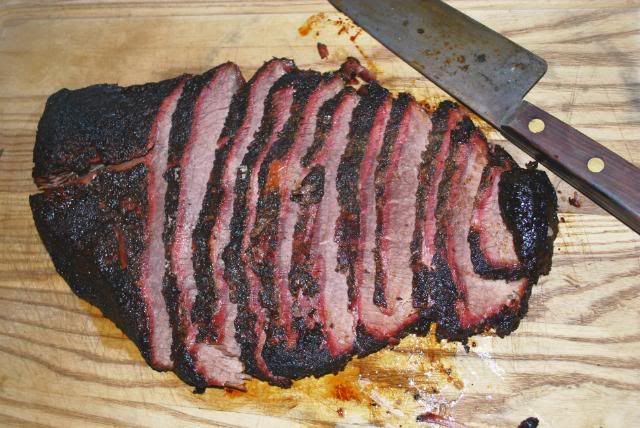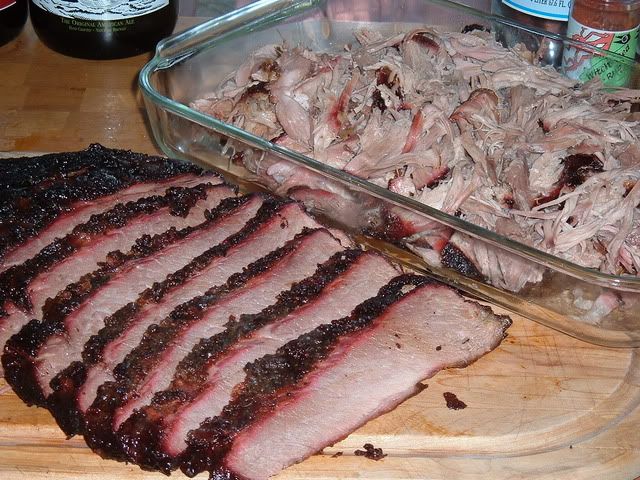Welcome to the EGGhead Forum - a great place to visit and packed with tips and EGGspert advice! You can also join the conversation and get more information and amazing kamado recipes by following Big Green Egg to Experience our World of Flavor™ at:
Want to see how the EGG is made? Click to Watch
Facebook | Twitter | Instagram | Pinterest | Youtube | Vimeo
Share your photos by tagging us and using the hashtag #BigGreenEgg.
Share your photos by tagging us and using the hashtag #BigGreenEgg.
Want to see how the EGG is made? Click to Watch
the smoke ring and the egg

fishlessman
Posts: 34,594
azrp's post has me wondering why its so easy to produce a smoke ring in the egg.
im not sure why but the egg just produces smoke rings. explain these briskets, the first two only seen smoke for a max of two hours and were wrapped and cooked hot and finished in a little over 4 hours total, the last is a true low and slow at 12 hours. the rings all look the same to me



im not sure why but the egg just produces smoke rings. explain these briskets, the first two only seen smoke for a max of two hours and were wrapped and cooked hot and finished in a little over 4 hours total, the last is a true low and slow at 12 hours. the rings all look the same to me



fukahwee maine
you can lead a fish to water but you can not make him drink it
Comments
-
i'm pretty sure the reason yours have similar rings is that the ring forms early in the cook, and once the meat where the ring is hits about 140, the formatin stops.
smoke flavor keeps being added, but the ring stops forming
...but... i did a brisket the other week that had no ring whatsoever, despite going in cold, early (and continuous) smoke, etc.
was a real head-scratcher. -
it just seems to break the rules ive learned. the meat were the ring is was probably past 140 in the first maybe 15 minutes on the first two pics. those cooks had internals past 180 in less than 2 hours then they were taken out of the smoke all togetherfukahwee maineyou can lead a fish to water but you can not make him drink it
-
About.com has this to say about it:
http://bbq.about.com/od/barbecuehelp/g/gsmokering.htm
Wikipedia only says this:
"A smoke ring is also the name for the pink ring that forms around the edges of meat prepared by smoking, caused by myoglobin in the meat reacting with carbon monoxide to form a heat stable pigment."
Personally, I think it's magic, but what do I know? I just play here.
Spring "Watch What Happens When I Close The Lid On My Egg" Chicken
Spring Texas USA -
i think its magic too :laugh: all that stuff about maximizing time to produce a smoke ring before temps reach 140 must be for metal smokers :laugh:fukahwee maineyou can lead a fish to water but you can not make him drink it
-
I think the meat will only handle a certain level of smoke ring, as staying in the sun too long will only burn the human skin so long, then it does nothing. The smoke ring is the same, fresh flesh is easy for it to penatrate, but once it has a sear, or scab, bark or something that would stop the smoke, then it is done. But on the flip side you dont see a ring on chicken too often do you.
-
But is there a correlation?
-
hahaha
yes. no smoke ring in the first two hours, AND my house is appraised in the mid to high 200s.
just ordered a custom garage door (finally), and that should help.
where you been? killing beasts, fish, and fowl? -
but the dome temp at 250 means they all probably hit 140 very quickly...
and the pics of AZRP's ribs (going on prewarmed) implies that the smoke ring may start and finish very quickly. (like fidel ,from what i hear )
) -
i broke all the rules with the first two, those were grilled between 350/375 for two hours, then braised in foil with some broth. the temp was up really quick, i did them direct over an open flame to boot. the last was inderect 235 at the grill level, temps in the smoke ring zone had to stay lower longer. all the details about smoke rings dont seem to be fully true, put the meat in cold, low and slow verse hot and fast, even starting lower for the first few hours then bring the temp up, etc.fukahwee maineyou can lead a fish to water but you can not make him drink it
-
now i need to low andd slow a chicken. :laugh: heres a smoke ring on a duck

http://www.eggheadforum.com/index.php?option=com_simpleboard&func=view&id=237371&catid=1fukahwee maineyou can lead a fish to water but you can not make him drink it -
There a number of things that contribute to good ring formation.... pit/meat temperature, correct vent settings to get the best benefit of the nitrogen from your flavor wood, moisture (either on the meat, in the meat, or from a water pan, or cooking in a ceramic cooker that holds moisture), type of charcoal you use, and the size of the cuts or how full the cooker is.
I have updated my smoke ring page recently Smoke rings and I visit about all these things, of course with a lot of pictures of smoke rings, including one on a prime rib roast and one on a brisket than NEVER saw any smoke and cooked the entire time in my oven wrapped in foil.Happy Trails~thirdeye~Barbecue is not rocket surgery -
oy. too many variables. i don't have the brane fer it today. I'm pulling my damn hair out right now trying to wrestle some frigging polygons in maya. I hate maya, and 3ds is no better…. Maybe I'll just cook a damn steak
don't mind me. rambling, and officially OT -
As I have said it it better called a "chemical Ring" You can produce a "smoke ring" with Tenderquik and your oven..
The smoke ring has nothing to do with SMOKE. If there isn't a good balance of salt in the rub you will not see a smoke ring. -
Very nice update to the page. Thank you for the updated information.
Kent -
Thirdeye,
Nice write-up. Thanks. TP -
good writeup, never gave much thought in how important the moisture in there was in regards to a ring. still kinda thinking that the metal smokers need alot more finessing to achieve a good ring. my first two pics had very little salt, just a dusting of onion salt and heavey on the pepper and cooked hot and fast, still a good smoke ring for doing things completely against what ive learned in how to achieve themfukahwee maineyou can lead a fish to water but you can not make him drink it
-
What part does salt play in creating the "chemical ring"?
I was under the understanding that it is caused by a reaction between the myoglobin in the meat and various gasses given off by the burning charcoal. I don't see where salt is necessary at all.
I guess quoting an expert will help here, so let me toss out Joe Cordray. He is the Meat Extension Specialist at Iowa State University’s nationally renowned Meat Lab, located in Ames, IA.
On the topic he says:
"When a smoke ring develops in barbecue meats it is not because smoke has penetrated and
colored the muscle, but rather because gases in the smoke interact with the pigment myoglobin.
Two phenomenon provide evidence that it is not the smoke itself that causes the smoke ring.
First, it is possible to have a smoke ring develop in a product that has not been smoked and
second, it is also possible to heavily smoke a product without smoke ring development.
Most barbecuers use either wood chips or logs to generate smoke when cooking. Wood contains
large amounts of nitrogen (N). During burning the nitrogen in the logs combines with oxygen
(O) in the air to form nitrogen dioxide (NO2). Nitrogen dioxide is highly water-soluble. The pink
ring is created when NO2 is absorbed into the moist meat surface and reacts to form nitrous acid.
The nitrous acid then diffuses inward creating a pink ring via the classic meat curing reaction of
sodium nitrite. The end result is a "smoke ring" that has the pink color of cured meat."
So please expand on your claim that salt is necessary. -
Mike,
You might not remember this but several years ago, for some reason, there were a lot of WSM owners that purchased Eggs. One of the things they commented on was a lack of, or not as good of a smoke ring when cooking in their Eggs.
Now, they were using the same cuts of meat, the same pit temps, the same cook time, the same seasonings.... everything was the same. Except for switching from briquettes to lump coal, and the fact that a WSM has a water pan. I'm sure some tried adding liquid to the drip pan in their Eggs, but a piece of advice on another forum came from a Cookshack owner. That was to add a couple of briquettes atop the lump.Happy Trails~thirdeye~Barbecue is not rocket surgery -
Interesting information.
It's got me wondering if the smoke ring can be formed in different ways. Looking at thirdeye's writeup, the last picture cooked in the oven and no smoke - unless I missed something...
[url=]http://playingwithfireandsmoke.blogspot.com/1996/03/smoke-rings.html[/url]
GG -
Tenderquick adds the nitrites/nitrates instead of the burning lump in that example.
-
The term "Salt" can cover any number of Sodium, Potassium, Chloride, Nitrate compounds.
I guess so you will stop questioning everything I post I need to be more specific.
The "SMOKE" ring does not require smoke for it to occur. As I said it can be produced with Tender Quick and the heat in your oven. It requires heat and/or time and a substance that will produce nitrates.
http://bbq.about.com/od/barbecuehelp/g/gsmokering.htm
http://www.mortonsalt.com/products/meatcuring/tenderquick.html please note it contains SALT as well as sodium nitrate and sodium nitrite (both of which are chemically salts) which help promote the curing process and produce the "smoke" ring.
http://bbq.about.com/od/barbecuehelp/g/gsmokering.htm
Now I will admit that burning wood can and does produce the required Nitrates; however, it burning wood is not required to produce a smoke ring. -
Thanks.
-
I don't question everything you post Pete. I only question when I believe you are wrong. If it seems I question you frequently, well, I'll let you draw your own conclusions.
You said:
"If there isn't a good balance of salt in the rub you will not see a smoke ring."
That is not true. Period. I would hold that you can put a piece of unseasoned meat in the BGE and cook it over lump charcoal and get a smoke ring with absolutely no added salt.
Don't take my correction personally. I am only trying to prevent people who do not otherwise know better from believing false information that you pass along. You have a reputation of knowing a good deal about BBQ and cooking, so when you post something a lot of people accept it as gospel. In this instance, the information you posted was incorrect. I am one of the few people that actually has the tenacity to challenge people (not just you) when they are wrong. I don't do it to be a know-it-all, I do it to help educate people and to prevent them from passing along incorrect information to others in the future. -
and as I said NIRATES are salts. Whether that comes from the wood you burn and released by the burning of said wood or the addition of nitrates to rubs and adding a heat source is irrelevant. Smoke is NOT required to produce a "smoke ring".
Next time this subject comes up I will be more scientific in my response and totally confuse everyone. So you want a simplified explanation or the more scientific explanation.. Since I have been accused of being to complex in my answers I'll stick to the simple and wait for you to question me. -
fishless, I appreciate this thought provoking thread. Very interesting. I'm curious, of the three briskets you cooked which did you prefer?
-
I saw that post about the briquettes. My first thought was perhaps the stuff that is added to briquettes is what contributes to the smoke ring, not necessarily the charcoal in the briquette. For example, I understand that Henry Ford's version of briquettes contained coal dust from the coal mines, therefore, 'charcoal.' Would coal dust perform the same function as does other processes to produce a smoke ring?
Personally, I find the discussion interesting but I can always fall back on my Smoke Ring Gun.
I have a problem shooting through the ceramic though...
Spring "Ring Around The Smoke Ring" Chicken -
Necessary is the key word here. Look, however you get it.....Nitrogen dioxide is absorbed into the surface of the meat and forms nitrous acid. The nitrous acid travels inward and creates a colored smoke ring.
Think about this, in curing terms (when referring to pink salts or Tenderquick) salt is the "carrier" because these cures are between 1% and 6.25% nitrates, the rest is salt. So, salt does perform an important delivery action here. It's also worthy to point out that some salts do in fact have trace amounts of nitrates, so using them would give you a head start on a ring. A young barbecuer in Hawaii sent me some Hawaiian sea salt that is supposed to have some natural nitrates.
Where I'm headed with this is that when NO tenderquick is used, salt may help get the natural nitrous acid into the meat quicker than if you had unsalted meat.Happy Trails~thirdeye~Barbecue is not rocket surgery -
You know as well as I do that you weren't referring to nitrates when you said there had to be salt in the rub to get a smoke ring.
-
I don't know about that, but the list of additives in briquettes may include: limestone, sodium nitrate, borax, as well as the coal dust you mentioned.Happy Trails~thirdeye~Barbecue is not rocket surgery
-
In chemistry, I thought that "salt" specifically referred to the ionic compounds produced when an acid is neutralized by a base.
That is quite different from what is going on here where we have N + O2 --> NO2 and then NO2 + H20 --> H2NO3, and the nitric acid causes the coloration. It seems like what we have is the nitrate dissociating an H+ (or two, since nitric acid is diprotic) from the water and that is the cause of the color change.
Is there a base in the meat that subsequently neutralizes the acid, creating a nitrate salt during the formation of the smoke ring? If so, what is the base?
Categories
- All Categories
- 184K EggHead Forum
- 16.1K Forum List
- 461 EGGtoberfest
- 1.9K Forum Feedback
- 10.5K Off Topic
- 2.4K EGG Table Forum
- 1 Rules & Disclaimer
- 9.2K Cookbook
- 15 Valentines Day
- 118 Holiday Recipes
- 348 Appetizers
- 521 Baking
- 2.5K Beef
- 90 Desserts
- 167 Lamb
- 2.4K Pork
- 1.5K Poultry
- 33 Salads and Dressings
- 322 Sauces, Rubs, Marinades
- 548 Seafood
- 175 Sides
- 122 Soups, Stews, Chilis
- 40 Vegetarian
- 103 Vegetables
- 315 Health
- 293 Weight Loss Forum

